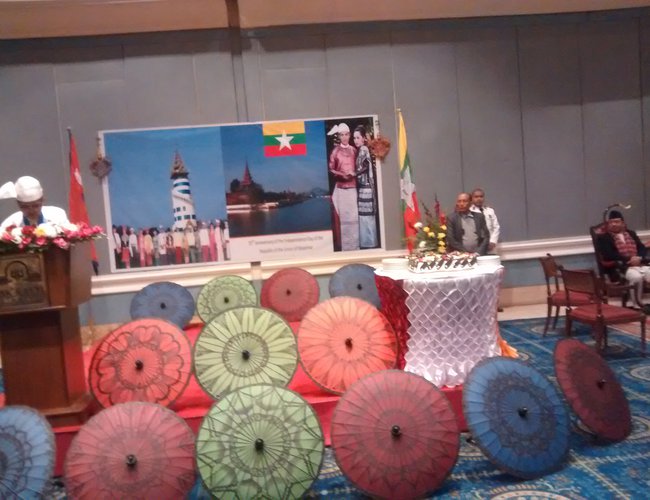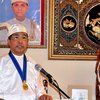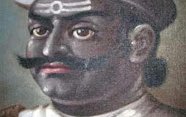
It is my great pleasure and honor to welcome you to the 70th Anniversary of the Independence Day Reception of our Embassy. In fact, 4th January is our Independence Day and we usually celebrate this occasion in the right date every year. But, as all of you may aware, I've just arrived in Kathmandu and at that time when I arrived, my credential ceremony is not confirmed yet. And more importantly, within a week I just arrived, there was an official visit of our Army Chief, Senior General Min Aung Hlaing to Nepal.
I would like to briefly touch on our bilateral relation, between Myanmar and Nepal. The diplomatic relations between our two countries was established in 1960 and now, 57 years had already passed. In fact, our people to people relations have started since 150 years ago. Moreover, we have learned that in our Buddhist literature, the noble son of Nepal, Lord Buddha, had made itinerary to Myanmar 5 times 2600 years ago. So, we can say that our two countries relation was longer than the years of the formal Diplomatic relation and it is based on not only people-to-people contact but also religious affairs.
Since the age of Second World War, nearly three hundred thousand of Nepalese origins migrated to Myanmar and they are now well integrated into our society. There are also approximately one hundred thousand of their relatives are staying in Nepal and they bridge the two countries to a close friendship at the people's level. Even in our Army, there are currently 400 Gurkhas soldiers and some of them are officers. In 1950, Suk Bahadur Rai who is a Nepalese Gurkha and a soldier from Burma Rifles Battalion was conferred the title of Aung San Thuriya. This title is the highest military award in Myanmar and to this day, there have only been 6 Aung San Thuriya medals has been awarded and only one of the recipient is civilian.
Moreover, over 21,000 of Myanmar pilgrims are visiting Lumbini in every year. According to the statistic of the Lumbini Development Trust in 2017, Myanmar is ranked 3rd position among the top countries in terms of the number of travelers visiting Nepal. Having this connection between the two countries provides us the opportunity to further strengthen the friendship and cooperation between our two countries and two peoples.
Over the years, the two countries have steadily maintained the good cooperative and friendly relations with exchanges of both high levels and ministerial levels visits that opened up enhanced bilateral cooperation in areas such as trade and agriculture, energy, and culture exchange for mutual benefits. I feel that the two countries have rooms and potentials to further expand in the areas of tourism, trade and investment sectors. On my part, I will render all my utmost cooperation and support to make them possible. Thus, I do believe that our relations will be further enhanced through increased contacts in the Non- Aligned Movement and regional forums such as BIMSTEC, ACD (Asia Cooperation Dialogue) and SAARC and also we will be working more closely in the years to come for the mutual benefits of our people.
In Myanmar, there are 135 different ethnic groups and the largest populated ethnic groups are Kachin, Kaya, Kayin, Chin, Mon, Burma, Rakhie and Shann, each with its own history, culture and language. That is why Myanmar is a multi-ethnic, multi-lingual and multi-cultural country.
Since the olden days, our country has existed as an independent and sovereign country under our own King.We lost our sovereign kingdom in 1885. To liberate ourselves from this situation, all the ethnic, national races, from the mountains to the plains, sacrificed their lives, blood and sweat to escape from this situation.
On 21th February 1947, the leader of Myanmar Independence movement, General Aung San, who is the husband of the first Myanmar Ambassador to Nepal, Maha Thiri Thudhamma Daw Khin Kyi and who is also the father of our incumbent State Counselor and Foreign Minister Daw Aung San Suu Kyi, and our ethnic leaders together signed the Panglong Agreement which depicted unity of our ethnic and laid a sound foundation for our Independence.
So, we celebrate Union day in every February 12 as a memorial to the Panglong Agreement which pronounced full independence in internal governance and was the sole reason on why the county achieved its centralized system of government.
As a result of these efforts, we were able to achieve our Independence, a symbol of our success on 4th January 1948, after we signed the Panglong Agreement. Today is the 70th anniversary of the regaining of independence for the Republic of the Union of Myanmar.
Although Myanmar gained independence in 1947, there had been suspects and conflicts among the fellow national races due to certain causes, resulting in a disruption to the development of the country. Hence, over the past seven years became watershed years as the reformist civilian governments took over the State’s responsibility and took tangible steps towards democratic transitions. Another significant development worthy of mentioning is holding of democratic general elections on 8 November 2015. The 2015 general elections have been a departure from the past as Myanmar matured and gained experiences that were brought on by political reforms and openness.
In here, I would like to rephrase our State Counselor, Daw Aung San Suu Kyi's message which was delivered at the opening ceremony of the 21st Century Panglong Conference held in Nay Pyi Taw on 24 May 2017. She stated that "If a country does not have peace, stability and reconciliation, its development will only last for a short time" and "If we can leave the peace that can bring about unity and sustainability to our future generation, it will be an everlasting heritage for them".
That is why our incumbent Government is trying to implement the national reconciliation and State peace process by holding the 21st-century Panglong Peace Conference. In our country, all national, ethnic races are striving to achieve peace using all available means. We have been able to successfully convene the Second Session of the Union Peace Conference – 21st Century Panglong and agreement has reached to some basic principles of the federal structure.
So, we do believe that we will be able to march towards the goal of attaining Union Peace and the establishment of a Democratic Federal Union very soon.
Thiri Pyanchi U Tun Nay Lin is an ambassador of Republic of the Union of Myanmar to Nepal. Excerpts of the statement delivered at the 70th Anniversary of Independence Day ceremony of the Republic of the Union of Myanmar.

















